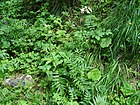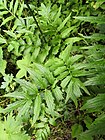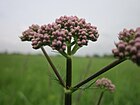Note: This is a project under development. The articles on this wiki are just being initiated and broadly incomplete. You can Help creating new pages.
Difference between revisions of "Valeriana officinalis"
| Line 5: | Line 5: | ||
==Parts Used== | ==Parts Used== | ||
| − | {{Parts Used|}}, {{Parts Used| | + | {{Parts Used|Roots}}, {{Parts Used|Rhizomes}}. |
==Chemical Composition== | ==Chemical Composition== | ||
Latest revision as of 19:36, 31 August 2020
Valeriana officinalis is a perennial plant that can grow up to 1.50 metres tall. It is harvested from the wild for local use as a food, medicine and source of materials.
Contents
- 1 Uses
- 2 Parts Used
- 3 Chemical Composition
- 4 Common names
- 5 Properties
- 6 Habit
- 7 Identification
- 8 List of Ayurvedic medicine in which the herb is used
- 9 Where to get the saplings
- 10 Mode of Propagation
- 11 How to plant/cultivate
- 12 Commonly seen growing in areas
- 13 Photo Gallery
- 14 References
- 15 External Links
Uses
Nervous overstrain, Blood pressure, Painful menstruation, Cramps, Hypertension, Irritable bowel syndrome, Liver problems, Eczema, Ulcers, Minor injuries.[1]
Parts Used
Chemical Composition
This plant is rich in essential oils, iridoids, flavonoids, alkaloids, amino acids, and lignanoids etc.[2]
Common names
| Language | Common name |
|---|---|
| Kannada | |
| Hindi | |
| Malayalam | |
| Tamil | |
| Telugu | |
| Marathi | |
| Gujarathi | |
| Punjabi | |
| Kashmiri | |
| Sanskrit | |
| English |
Properties
Reference: Dravya - Substance, Rasa - Taste, Guna - Qualities, Veerya - Potency, Vipaka - Post-digesion effect, Karma - Pharmacological activity, Prabhava - Therepeutics.
Dravya
Rasa
Guna
Veerya
Vipaka
Karma
Prabhava
Habit
Identification
Leaf
| Kind | Shape | Feature |
|---|---|---|
Flower
| Type | Size | Color and composition | Stamen | More information |
|---|---|---|---|---|
| {{{5}}} |
Fruit
| Type | Size | Mass | Appearance | Seeds | More information |
|---|---|---|---|---|---|
Other features
List of Ayurvedic medicine in which the herb is used
Where to get the saplings
Mode of Propagation
How to plant/cultivate
A very easily grown plant, it succeeds in ordinary garden soil, preferring a rich heavy loam in a moist site.[4]
Commonly seen growing in areas
Grassland, Scrub, Woods, Damp soils.
Photo Gallery
References
- ↑ Indian Medicinal Plants by C.P.Khare
- ↑ Chemical costituents
- ↑ [Morphology]
- ↑ Cultivation
External Links
- Ayurvedic Herbs known to be helpful to treat Nervous overstrain
- Ayurvedic Herbs known to be helpful to treat Blood pressure
- Ayurvedic Herbs known to be helpful to treat Painful menstruation
- Ayurvedic Herbs known to be helpful to treat Cramps
- Ayurvedic Herbs known to be helpful to treat Hypertension
- Ayurvedic Herbs known to be helpful to treat Irritable bowel syndrome
- Ayurvedic Herbs known to be helpful to treat Liver problems
- Ayurvedic Herbs known to be helpful to treat Eczema
- Ayurvedic Herbs known to be helpful to treat Ulcers
- Ayurvedic Herbs known to be helpful to treat Minor injuries
- Herbs with Roots used in medicine
- Herbs with Rhizomes used in medicine
- Habit - Perennial
- Index of Plants which can be propagated by Seeds
- Herbs that are commonly seen in the region of Grassland
- Herbs that are commonly seen in the region of Scrub
- Herbs that are commonly seen in the region of Woods
- Herbs that are commonly seen in the region of Damp soils
- Herbs






